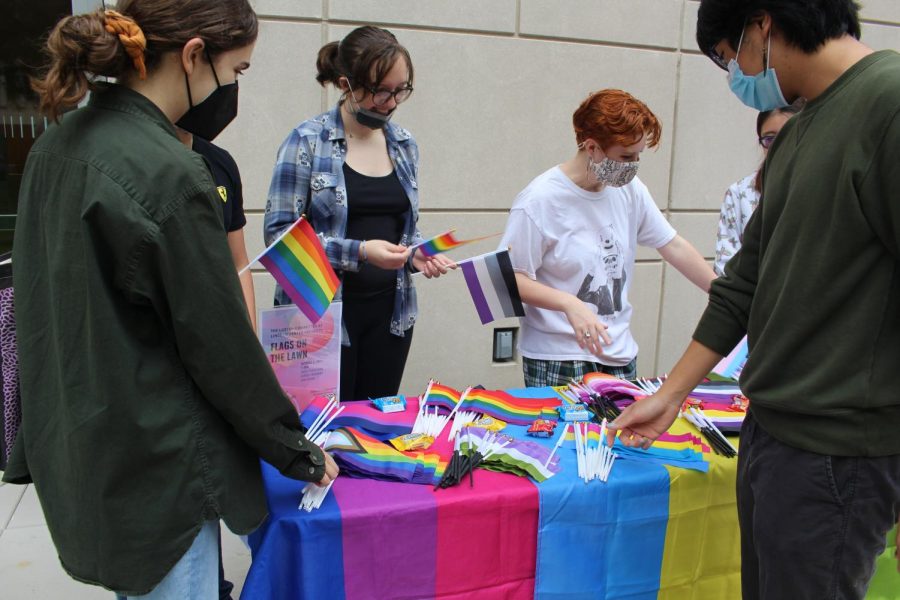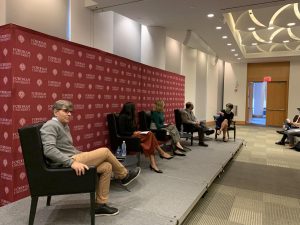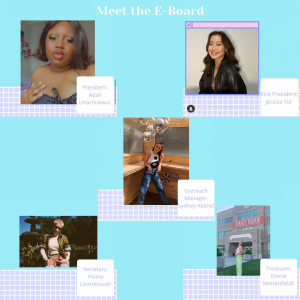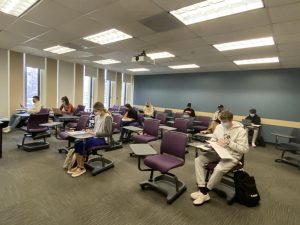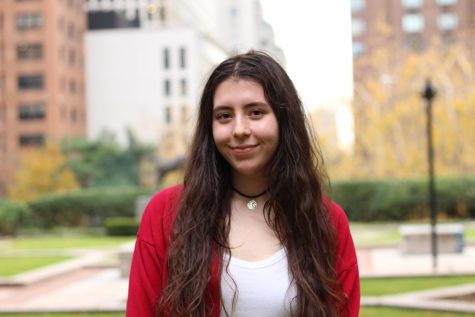OMA’s Signature Flags on the Lawn Begins LGBTQ+ History Month
The event is the first of many planned to celebrate and welcome Fordham’s LGBTQ+ community during October
This year’s Flags on the Lawn ceremony was a positive experience for many students.
October 25, 2021
The annual commencement of the Flags on the Lawn was one of the first planned events on Oct. 6 by the Office of Multicultural Affairs (OMA) to celebrate October’s LGBTQ+ History Month. OMA’s LGBTQ+ History Month Committee has several other programs designed to commemorate the month.
Located on the Outdoor Plaza, the Flags on the Lawn represented the history of Pride flags. Event organizers created a circular formation on the lawn with a multitude of pride flags, including gay, lesbian, bisexual, pansexual, transgender, nonbinary and other broader umbrella flags that represent different sects of the LGBTQ+ community. Event organizers also handed out free Pride flags and a board with information on the dimensions and history of Pride flags.
“To let the undergrad population understand a little more about pride flag history, its creators, notable figures related to the flags and to physically show something to the campus through the flags is significant,” Kenneth Tang, Fordham College at Lincoln Center (FCLC) ’24 and the cultural program coordinator of the committee, said.
The event’s inclusion of pride flags was designed to show an “individual’s identity as a flag connected in a circle, to form some kind of physical bond between the students and the educational component,” Tang said.
Kokila Sharda, FCLC ’24, complimented the arrangement of the event and the inclusivity of many identities within the LGBTQ+ community.
“The fact they were giving out flags makes me feel like the Fordham community is a lot more inclusive,” Sharda said.
“Because it is LGBT History Month, it is important to display the history of the identities and flags we have represented here today, showcasing what a great history we do have in this community.” Maura Johnston, FCLC ’24 and an OMA committee member
Other students commented on the impact the event will have on the educational experience for students.
“It will impact (the community) in a positive way because you share who you are in a very visual way, which is important for people to see,” Ramsay Macdonald, FCLC ’25, said.
Maura Johnston, FCLC ’24 and an OMA committee member and event organizer, explained that it is crucial for people to learn the origins and history of pride flags and what they signify when celebrating LGBTQ+ history.
“Because it is LGBT History Month, it is important to display the history of the identities and flags we have represented here today, showcasing what a great history we do have in this community … There are so many differences in identities that you can find your community here and educate everyone about it,” they said.
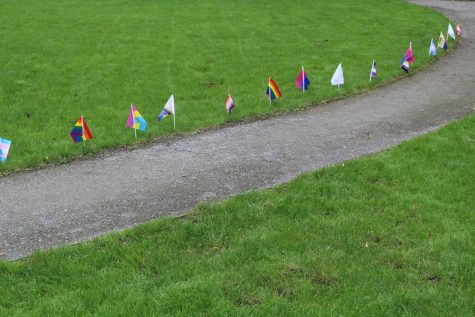
In addition to the Flags on the Lawn event, OMA’s LGBTQ+ History Month Committee is hosting other activities. The office hosted its LGBTQ+ Kickoff Lunch on Oct. 1 and also initiated the Queer Letter Exchange for queer people at Fordham to connect with one another; they are also hosting the Deeper Dialogue program aimed at facilitating discussions about different LGBTQ+ experiences. Later in October is the LGBTQ+ Ally & Network of Support Training, where participants will obtain knowledge toward promoting inclusivity on campus, and a wrap-up celebration.
Anisa Rahaman, OMA’s FCLC graduate intern, said the committee is “actively involved” in the preparations of these events. Open to all students, the LGBTQ+ History Month programs have been targeted specifically toward Fordham members of the LGBTQ+ community to afford them a sense of belonging at Fordham.
“We want to make sure they feel a sense of belonging here on campus,” said Juan Carlos Matos, assistant vice president for Student Affairs for Diversity and Inclusion. Matos noted that the events are a window of opportunity for those who do not identify with the LGBTQ+ community to come in support, show their allyship and expand their knowledge on topics they may have not known about.
“What we end up hearing from students is that it feels good to have this on campus, by making a sense of connection to Fordham.” Juan Carlos Matos, assistant vice president for Student Affairs for Diversity and Inclusion
These events have been able to provide diverse student engagement on intersectionality, discourse on multicultural and intercultural competence and a welcoming and inclusive environment. “Based on a lot of student feedback, we are accomplishing that,” Matos said.
As mentioned by Matos, some students have reportedly had preexisting worries over the possibility of their identities being underrepresented at Fordham. “What we end up hearing from students is that it feels good to have this on campus, by making a sense of connection to Fordham,” Matos assured.
Matos has applauded the committee’s work thus far in planning events for LGBTQ+ History Month.
“The committee is trying to raise the momentum of having more and more LGBT+ students feel supported, heard and that they matter,” he said. “A lot of the programming really comes from that place and that sort of is where we have been growing for the past three years.”

